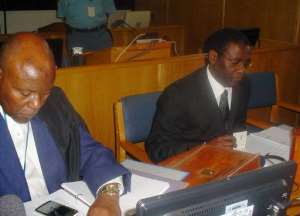
Arusha (Tanzania) (AFP) - Rwandan minister who was sentenced to 35 years in jail for his involvement in the 1994 genocide saw his sentence lowered to 30 years on appeal Thursday, a UN tribunal said.
The court confirmed Augustin Ngirabatware's genocide convictions but reversed his conviction for rape as a crime against humanity.
"(The appeal ruling) sets aside the sentence of 35 years of imprisonment and imposes a sentence of 30 years of imprisonment," Judge Theodor Meron said.
Ngirabatware, planning minister at the time of the 1994 genocide, was in 2012 found guilty of inciting, aiding and encouraging militiamen in his home district of Nyamyumba in northwestern Rwanda to kill their Tutsi neighbours.
His appeal proceedings were handled by the UN-backed Mechanism for International Criminal Tribunals (MICT), charged with taking over the residual cases of the International Criminal Tribunal for Rwanda (ICTR), which is to close its doors in 2015.
Ngirabatware, 57, is the son-in-law of Felicien Kabuga, who is accused by the tribunal of having bankrolled the genocide and is the most notorious of the nine people indicted by the tribunal still at large.
An economist educated in Switzerland, Ngirabatware fled Rwanda in July 1994. He worked in research institutes in Gabon and France before being arrested in Germany in 2007 and transferred to the ICTR a year later. His trail opened in 2009.
The ICTR, based in the northern Tanzanian town of Arusha, was set up in 1994 just months after the genocide in which an estimated 800,000 people, most of them Tutsi, were killed.
It has convicted 61 people and acquitted 14 others.




 Supreme Court adjourns anti-LGBTQI bill case indefinitely, orders Speaker Bagbin...
Supreme Court adjourns anti-LGBTQI bill case indefinitely, orders Speaker Bagbin...
 Mahama will destroy Akufo-Addo’s legacy of looting, economic decay – Edudzi Tama...
Mahama will destroy Akufo-Addo’s legacy of looting, economic decay – Edudzi Tama...
 Rain with thunderstorms accompanied by gusty winds expected in southern Ghana la...
Rain with thunderstorms accompanied by gusty winds expected in southern Ghana la...
 Voter registration: EC's 'lazy' approach in Eastern Region 'worrying' —NDC
Voter registration: EC's 'lazy' approach in Eastern Region 'worrying' —NDC
 Residents fume over deplorable TOR road despite government promise
Residents fume over deplorable TOR road despite government promise
 ‘Allawa’ is here to stay; I will continue paying nursing, teacher training allow...
‘Allawa’ is here to stay; I will continue paying nursing, teacher training allow...
 Akufo-Addo is a major problem for Bawumia’s campaign; they won’t know until they...
Akufo-Addo is a major problem for Bawumia’s campaign; they won’t know until they...
 Chief Justice allows live coverage of hearings challenging anti-LGBTQ+ bill
Chief Justice allows live coverage of hearings challenging anti-LGBTQ+ bill
 1D1F: Gov’t has overseen the development of 321 projects – Akufo-Addo
1D1F: Gov’t has overseen the development of 321 projects – Akufo-Addo
 Allow live media coverage during the proceeding of anti-gay bill cases — Attorne...
Allow live media coverage during the proceeding of anti-gay bill cases — Attorne...
